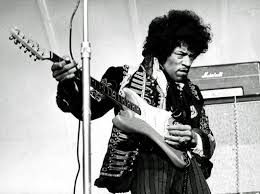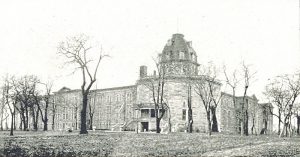Jimi Hendrix stands before over 200,000 people about to make musical history. It’s 1969, in the middle of the war in Vietnam. The Vietnam War was one of the bloodiest in this nation’s history, people who went to Vietnam often returned in a damaged state, if they returned at all.1 At the time, the presidential approval rating in the war was only around 39 percent, and Jimi Hendrix prepared to demonstrate his opinion of the war with his rendition of the National Anthem.2

Before Hendrix was a famous musician, he was in the military. He was honorably discharged due to an ankle injury. He had signed up for one year, however, while on duty, he couldn’t hold intelligent conversations, fell asleep, and was more focused on his guitar than his work. After he was discharged, he shifted his focus completely to his guitar. Soon after, his music career took off and he released “Hey Joe” with his band The Jimi Hendrix Experience. He quickly rose to fame, and soon after he was headlining his own tours and selling out massive shows. 3
Rain delays caused Hendrix to play on Monday at Woodstock that year. While he was offered an opportunity to perform at midnight, he chose to play the next morning. Even though Hendrix passed on the opportunity to play in front of the massive crowds that were still there at midnight, he still played for dedicated fans. However, he didn’t come for the fans, he came for the experience. Hendrix’s performance was shaped by the the current state of the Vietnam War, which was at its peak when he played. Hendrix’s music was also shaped by his complete unwillingness to conform, he refused to be a part of normal society, and he refused to support the war.4 Over 58,200 American soldiers died in the Vietnam War, and many of the people in the United States didn’t know why the nation was fighting, and many just wanted peace. This political context fueled Hendrix’s passion-filled performance which lasted over two hours, and included an encore. Encores were rare for Hendrix, and so concert-goers were ecstatic.

The performance included a medley of some of his songs, and in the middle of this is when he made musical history. Jimi Hendrix played a solo version of the National Anthem. His rendition included many parts of the song where he misplayed the song on purpose. He dragged out the notes for “the bombs bursting in air,” showing that the Star Spangled Banner talks about America’s history involving many wars. He also misplayed the notes for “home of the brave,” drawing to question why we call the men fighting a war with very little acceptance in our country heroes. Because he was in the military, he knew how the system worked, and he didn’t like it. He also added in parallels and similarities to the song “taps,” to show the amount of death the country had seen, as if to ask “is it worth it”? He purposely dropped the notes and let them come out unclean and muffled. He wanted to display that even something as patriotic as the National Anthem glorified our nation’s destructive ways of solving international issues. He did this by accenting the notes where this was prevalent and bringing attention to them. The audience had mixed reactions however. While many of them saw the passion-filled protest he was trying to portray, some of the fans were appalled by how he played the national anthem. People wrote to media networks saying that what he did was a disgrace. His performance was a polarizing force, he was able to both unite people behind him and the war protests, as well as causing people to speak up against the desecration of our National Anthem.5
Hendrix made music history because he had so many fans, and he was able to actively voice his opinion without using words. Whether you agree with his protests or not, he was very successful at gathering a crowd and influencing their thoughts.6

- “PART IV: TO LIFE: War = Killing,” AirWAVES (May 1999): 235–36. ↵
- W. Dennis, “Ritual Behavior and Consumer Symbolism,” ACR Special Volumes, (January 01, 1984): 279-284 ↵
- Andy Bennet, “Remembering Woodstock,” Taylor & Francis Group, (September 29, 2017): 1-4 ↵
- Wendy Smith, “Rock of Ages: Forty Years after Their Deaths, Jimi Hendrix and Janis Joplin; Now Seem Part of the Mainstream Culture They Rebelled Against.” American Scholar, 79 no. 4(2010): 89–92. ↵
- Clague, Mark. “‘This Is America’: Jimi Hendrix’s Star Spangled Banner Journey as Psychedelic Citizenship.” Journal of the Society for American Music 8 4(2014): 435–78. ↵
- Anne-Marie Morrissey, “Beyond the Image: The Giftedness of Jimi Hendrix,” Roeper Review 24 no. 1( 2001): 5. ↵



56 comments
Olivia Santiago
Hendrix is an artist that will forever be relevant, because of his knowledge and understanding of people, and how he was able to tell stories through his music. I think this article does a phenomenal job and showcasing this ability, as it analyzes in depth how Hendrix deliberately morphed and distorted the anthem, and his calculated impulsivity- which seems like a paradox of itself. But that’s exactly what Hendrix was. He cared for people and their well-being, but didn’t care too much about what they thought of him. It is the inclusion of this fact that makes this article so accurate and impressive.
Cameron Lopez
I know the name Jimi Hendrix, such an icon during the late 60’s and early 70’s I’ve known his name just never listened to his songs. This article is a good insight to his life and career, the things he did and the protesting was very creative and moving. For example I had no clue that he was in the military and then got discharged. Good article to read. Great job
Danniella Villarreal
The Jimi Hendrix Experience is my mothers’ favorite band and I love that this article exists because we were both able to read it together. He didn’t waste his talent on the sole purpose to bring fame but to express his views and many others. It is interesting to see how something as patriotic as the anthem can be such a powerful tool for protests both in the past and in the present. This article was very fun to read and had a lot of nice detail.
Rosario Moreno
I never knew much of Jimi Hendrix, only that he was an amazing musician. After reading this article I have a much more greater appreciation for him. The reason being is I personally love seeing artist express their issues and others issues through their work. Great article on a great historic figure.
Danielle Slaughter
While I am personally opposed to desecrating the National Anthem, I respect the right to peacefully protest through whatever creative means one wishes. I cannot help but be reminded of parallels between what Jimi Hendrix did and what Colin Kaepernick is currently doing – different mediums, sure, but the same message. I found this article to be a very profound and poignant one in the midst of tension in our country, something that has wracked the United States from 1968 to 2018.
Ruben Basaldu
I think that everyone knows the name Jimi Hendrix because he was such an icon during his time. I am one of those people who know of Hendrix but never really listened to him all that much. This article was a nice little insight into his life and career. The way that he did things in terms of protesting was so creative and innovative. I had no idea that he was in the military and that got discharged. Great article and definitely worth the read.
Octaviano Huron
I enjoyed reading this article because it takes more of an unbiased approach to this situation. Jimi Hendrix was, no doubt, an outstanding guitar player. By his form of protest, he did unite and divide people in many ways regarding the Vietnam War. Addressing both sides of the argument, those in favor of the protest and those who detested it, truly brought this article to life. Thank you for writing an article about a musical icon gone too soon.
Mia Morales
Not only did Jimi Hendrix leave a legacy within his music and powerful guitar skills, he also left a legacy through his voice and what he represented to people across the world. He epitomized the want for change and protesting in a creative manner. He used the lyrics in his songs to express his political views and now remains an icon to the music industry.
Joshua Garza
The Jimi Hendrix Experience is my favorite band and I love that this article exists. Things that I learned from this article that I didn’t know before is that Hendrix played at Woodstock out of protest of the Vietnam War and that many people frowned upon him for that. Also one thing I would have liked to see in this article is a mentioning of the fact that Jimi Hendrix was half Native american. Overall great article and great subject.
Arieana Martinez
Jimi Hendrix was truly a voice of the people. He defied the status quo of people being forced to support a war that a majority of them did not support. But, through Hendrix’s amazing lyrics and soul in his music, he was able to deliver messages of how people truly felt, which was that they wanted love and not war. Hendrix is and always will be iconic, and this article perfectly portrayed that message. I really enjoyed that they spoke of his military past, which speaks largely to his knowledge and his truth behind the messages he preaches in his music through his personal experiences. Loved this article.